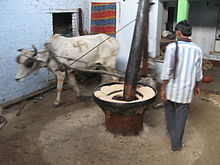Mustard oil

Mustard oil is an essential oil resulting from grinding the seeds, mixing them with water, and extracting the resulting volatile oil by distillation.
This oil has a distinctive pungent taste, characteristic of all plants in the mustard family, Brassicaceae (for example, cabbage, cauliflower, turnip, radish, horseradish, or wasabi). It is often used for cooking in India, Pakistan, Nepal and Bangladesh. In Bengal, Odisha, Assam, Meghalaya, Manipur, and Nepal, it is the traditionally preferred oil for cooking. The oil makes up about 30% of the mustard seeds. It can be produced from black mustard (Brassica nigra), brown Indian mustard (B. juncea), and white mustard (B. hirta).
The characteristic pungent flavour of mustard oil is due to allyl isothiocyanate. Mustard oil has about 60% monounsaturated fatty acids (42% erucic acid and 12% oleic acid); it has about 21% polyunsaturated fats (6% the omega-3 alpha-linolenic acid and 15% the omega-6 linoleic acid), and it has about 12% saturated fats.[1]
Mustard oil has high levels of erucic acid. Erucic acid may have toxic effects on the heart at high doses.[2][3] An association between the consumption of rapeseed oil and increased myocardial lipidosis, or heart disease, has not been established for humans.[4] Mustard oil is not allowed to be imported or sold in the U.S. for use in cooking, except for those products with exceptionally low erucic acid content.[5]
